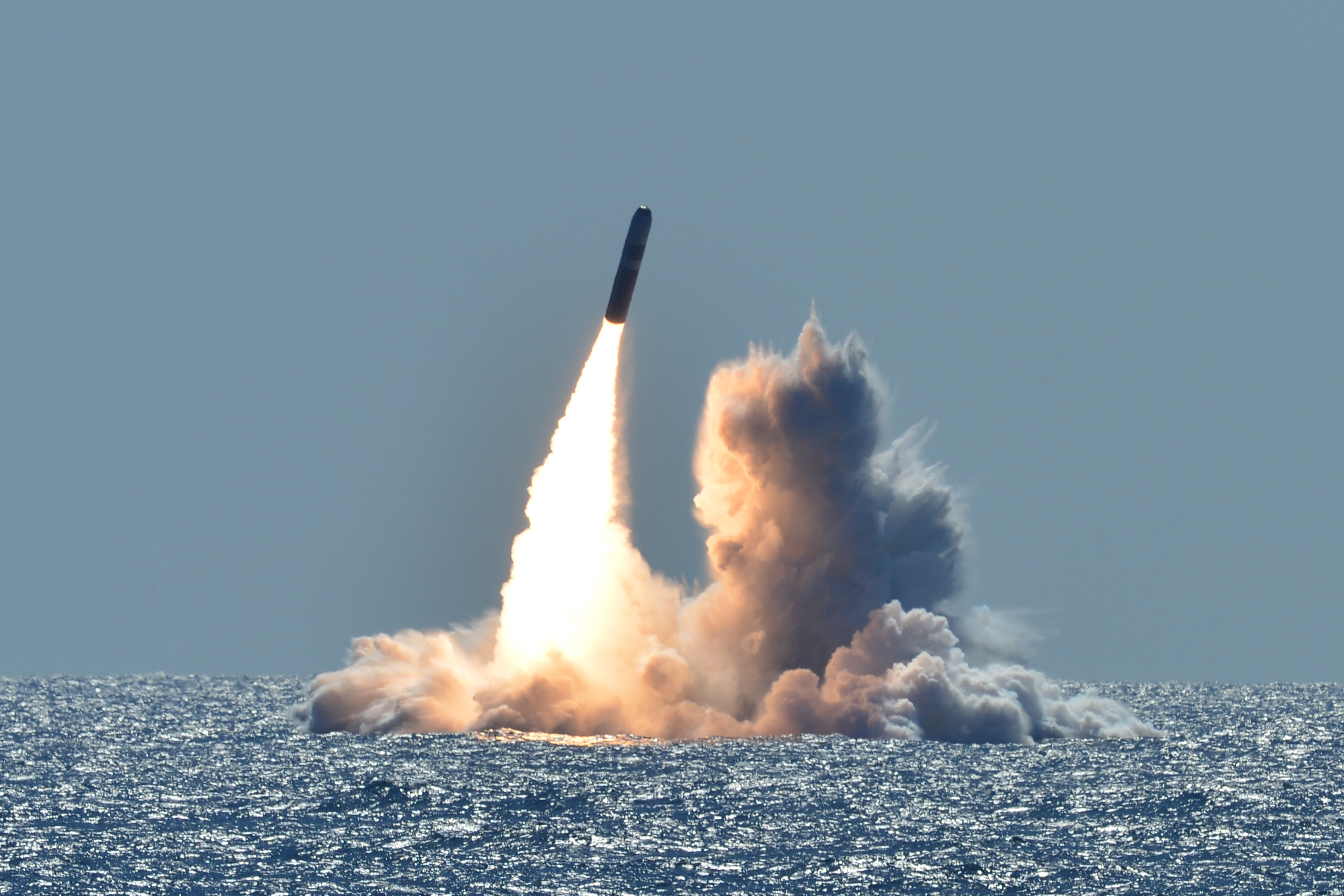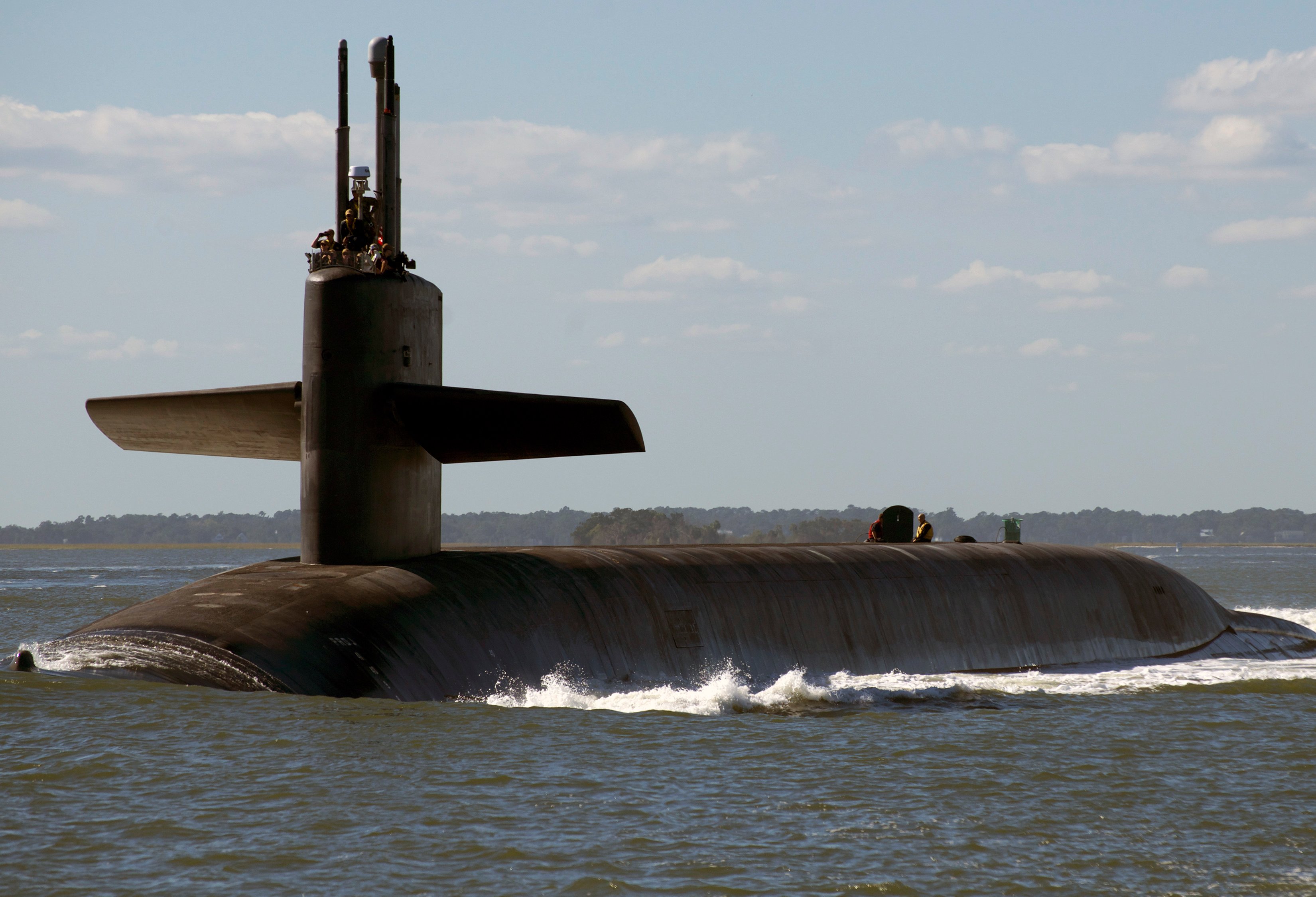
An unarmed Trident II D5 missile launches from the Ohio-class ballistic missile submarine USS Nebraska (SSBN-739) off the coast of California. US Navy Photo
The United States should conduct a new broad strategic review to evaluate global threats and determine its strategy, the head of U.S. Strategic Command said Tuesday.
During a virtual roundtable hosted by the Defense Writer’s Group, Adm. Charles Richard said he supports reassessing the nuclear posture review, but argued for a holistic approach to examine threats across the spectrum, as opposed to multiple reviews for different domains and capabilities.
“The threat is moving so fast that even given the time since the last nuclear posture review warrants another look at it to make sure that we still endorse our strategy and we have sufficient capability to execute that strategy,” Richard told reporters.
“But more broadly, I think a nuclear posture review is too narrowly defined. We face global threats and then to parse our examination of those into a nuclear posture review, a missile defense review, a space review, a cyber review, kind of misses the totality of what the strategic threat to this nation and our allies are. And I would recommend a broader-based strategic review as opposed to parsing it out in pieces.”
Richard, who previously served as the Navy’s commander of the service’s submarine forces, said a reassessment should include looking at the evolved threat from adversaries, substantiating the strategy and determining if the United States can achieve its objectives.
“Any service, any force, anything that the Department of Defense does is underpinned by an assumption that strategic deterrence – and inside that nuclear deterrence – is holding. And if strategic deterrence fails and in particular if nuclear deterrence fails, then we just ripped the underpinnings out of every [operation]-plan and the [concept of operations] for every other capability inside the department,” he said. “And so by whatever review mechanism we go do – whether we do it in pieces or we do it as a whole – recognizing that and acting accordingly I think is very important.”
President-election Joe Biden’s incoming administration is likely to reassess the nuclear posture review, a document that analyzes how nuclear weapons fit into the Pentagon’s strategy. The Trump administration published its own review in 2018, as did the Obama administration in 2010.
House Armed Services Committee Chairman Rep. Adam Smith (D-Wash.), who does not support buying the low-yield nuclear weapons the Trump administration called for in its 2018 assessment, told reporters in October he expected a Biden administration to reevaluate the nuclear posture review.

Ohio-class ballistic-missile submarine USS Tennessee (SSBN-734) gold crew returns to its homeport at Naval Submarine Base Kings Bay, Georgia, following a strategic deterrence patrol on Jan. 11, 2020. US Navy Photo
“So what I would want us to have is a nuclear arsenal that is sufficient to deter anyone from thinking that it makes sense to start a nuclear war because we can make it clear that the cost will be too high for them to do that,” Smith said at the time. “We have a nuclear arsenal that still envisions ‘winning’ a nuclear war; alright, that’s what I find insane.”
Speaking during today’s call, Richard posited that deterrence also requires a holistic approach.
“There’s no such thing as nuclear deterrence all by itself, or deterrence in cyber or deterrence in space, right. Deterrence has to do with an opponent’s decision making, right. It’s a fundamental equation for whatever aim the other guy or person desires – can I either deny that or impose a cost greater than what they seek, such that they choose restraint over action,” Richard said. “And that can play out in any domain. It plays out worldwide. It plays out with nuclear capabilities, conventional capabilities, cyber capabilities. And you’ve got to look at it as a spectrum.”
“If that equation fails at any point in its boundary conditions, then deterrence as a whole fails,” he continued. “And I think that’s an issue sometimes – that we talk about pieces of deterrence, but we don’t look at it in its totality. But that’s how it’s executed in practice.”
Asked what a low-yield nuclear weapon on a submarine would do, the chief of U.S. Strategic Command argued it would enhance America’s deterrence against a country like Russia.
“The fact that Russia has several thousand non-treaty accountable weapons is evidence that they at least perceive a deterrence gap where they think they have an advantage and that we would not be able to respond,” Richard said. “The low-yield nuclear weapon . . . enables me to close that perception gap and it improves deterrence and it improves the defense of this nation and our allies.”
The Defense Department in February acknowledged it had fielded a low-yield nuke on one of the Navy’s ballistic missile submarines.
Richard said he has participated in briefings with Biden’s transition team and will continue to do briefings as needed.
“They have gone well. We have some more planned in the future that we’re working on. And we’re fully ready to support the joint staff at [Office of the Secretary of Defense] in any other briefing requirements that they may ask of us,” he said.
"Review" - Google News
January 06, 2021 at 08:15AM
https://ift.tt/3hIrRCo
STRATCOM: US Needs 'Broader-Based Strategic Review' To Assess Threats - USNI News
"Review" - Google News
https://ift.tt/2YqLwiz
https://ift.tt/3c9nRHD
Bagikan Berita Ini














0 Response to "STRATCOM: US Needs 'Broader-Based Strategic Review' To Assess Threats - USNI News"
Post a Comment